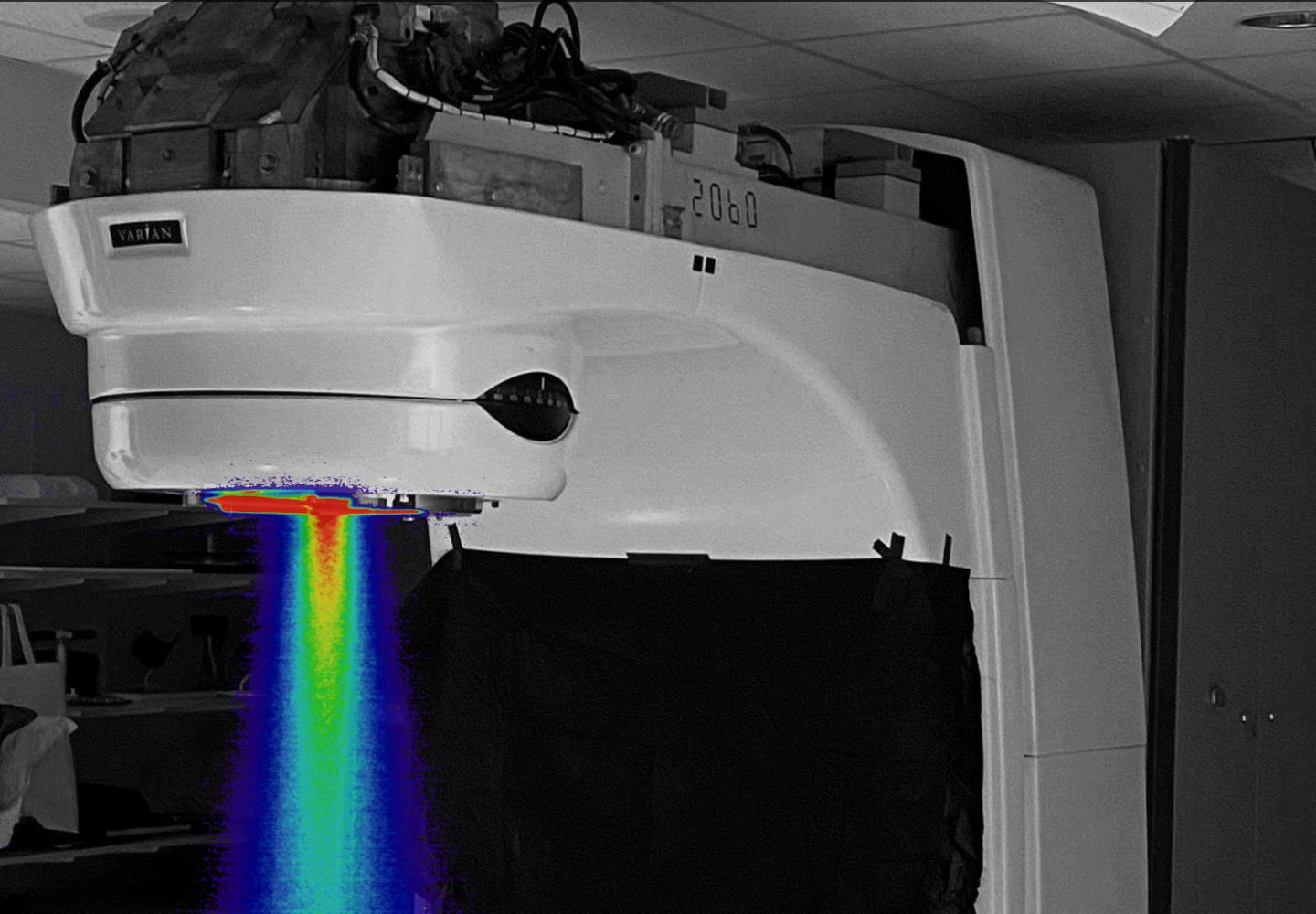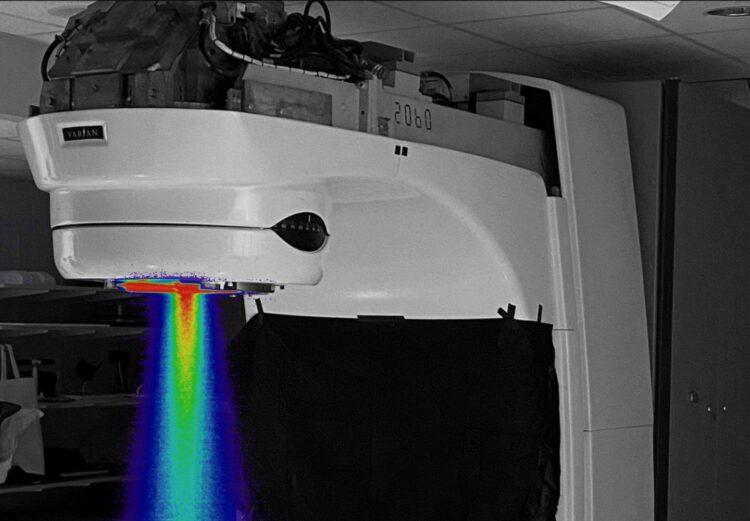Dartmouth researchers convert a standard linear accelerator used for delivery of radiation therapy cancer treatment, to deliver an ultra-high-dose rate radiation therapy beam to patients “in a flash.”

Credit: Brian Pogue, PhD
LEBANON, NH – A joint team of researchers from Radiation Oncology at Dartmouth’s and Dartmouth-Hitchcock’s Norris Cotton Cancer Center (NCCC), Dartmouth Engineering, and Dartmouth-Hitchcock’s Department of Surgery have developed a method to convert a standard linear accelerator (LINAC), used for delivery of radiation therapy cancer treatment, to a FLASH ultra-high-dose rate radiation therapy beam. The work, entitled “Electron FLASH Delivery at Treatment Room Isocenter for Efficient Reversible Conversion of a Clinical LINAC,” is newly published online in the International Journal of Radiation Oncology, Biology & Physics.
The exceptionally high dose rate is 3,000 times higher than normal therapy treatment (300 Gray per second vs. 0.1 Gray per second, Gray being a standard unit measuring absorbed radiation). Instead of treatment over 20 seconds, an entire treatment is completed in 6 milliseconds, giving the therapy its nickname, “FLASH.” “These high dose rates have been shown to protect normal tissues from excess damage while still having the same treatment effect on tumor tissues, and may be critically important for limiting radiation damage in patients receiving radiation therapy,” says Brian Pogue, PhD, Co-Director of NCCC’s Translational Engineering in Cancer Research Program and co-author on the project.
While the team awaits news of potential funding from the National Institutes of Health (NIH), early pilot funding from NCCC and Dartmouth’s Thayer School of Engineering allowed for prototyping of the converted LINAC. Pre-clinical testing of the beam began in August and has already provided key data on its potential for different tumor plans. “This is the first such beam in New England and on the east coast, and we believe it is the first reversible FLASH beam on a clinically used LINAC where the beam can be used in the conventional geometry with patients on the treatment couch,” says Pogue.
The FLASH beam is currently being used in preclinical studies on both experimental animal tumors as well as in clinical veterinary treatments, to study the normal tissue-sparing effects and how to maximize the value. The research group has expanded to involve physicians in clinical radiation oncology and dermatology, designing what they hope will be the first human safety trial with FLASH radiotherapy at Dartmouth-Hitchcock, treating patients advanced skin lesions that cannot be removed surgically.
###
The published project was led by researchers Rongxiao Zhang, PhD, Petr Bruza, PhD, David Gladstone, ScD, and P. Jack Hoopes, DVM, with work done by Dartmouth Engineering PhD students and first authors Ronny Rahman and Ramish Ashraf, and Dartmouth-Hitchcock engineering from Lawrence Thompson and Chad Dexter.
Brian W. Pogue, PhD, is Co-Director of the Translational Engineering in Cancer Research Program at Dartmouth’s and Dartmouth-Hitchcock’s Norris Cotton Cancer Center, MacLean Professor of Engineering at Dartmouth’s Thayer School of Engineering, Professor of Surgery at Geisel School of Medicine at Dartmouth, and President and Co-Founder of DoseOptics, LLC, which develops camera systems and software for radiotherapy imaging of Cherenkov light for dosimetry. His research interests include optics in medicine, biomedical imaging to guide cancer therapy, molecular-guided surgery, dose imaging in radiation therapy, Cherenkov light imaging, image-guided spectroscopy of cancer, photodynamic therapy, and modeling of tumor pathophysiology and contrast.
About Norris Cotton Cancer Center
Norris Cotton Cancer Center, located on the campus of Dartmouth-Hitchcock Medical Center (DHMC) in Lebanon, NH, combines advanced cancer research at Dartmouth College’s Geisel School of Medicine in Hanover, NH with the highest level of high-quality, innovative, personalized, and compassionate patient-centered cancer care at DHMC, as well as at regional, multi-disciplinary locations and partner hospitals throughout NH and VT. NCCC is one of only 51 centers nationwide to earn the National Cancer Institute’s prestigious “Comprehensive Cancer Center” designation, the result of an outstanding collaboration between DHMC, New Hampshire’s only academic medical center, and Dartmouth College. Now entering its fifth decade, NCCC remains committed to excellence, outreach and education, and strives to prevent and cure cancer, enhance survivorship and to promote cancer health equity through its pioneering interdisciplinary research. Each year the NCCC schedules 61,000 appointments seeing nearly 4,000 newly diagnosed patients, and currently offers its patients more than 100 active clinical trials.
About Dartmouth-Hitchcock Health
Dartmouth-Hitchcock Health (D-HH), New Hampshire’s only academic health system and the state’s largest private employer, serves a population of 1.9 million across northern New England. D-H provides access to more than 2,000 providers in almost every area of medicine, delivering care at its flagship hospital, Dartmouth-Hitchcock Medical Center (DHMC) in Lebanon, NH. DHMC was named again in 2020 as the #1 hospital in New Hampshire by U.S. News & World Report, and recognized for high performance in 9 clinical specialties and procedures. Dartmouth-Hitchcock also includes the Norris Cotton Cancer Center, one of only 51 NCI-designated Comprehensive Cancer Centers in the nation; the Children’s Hospital at Dartmouth-Hitchcock, the state’s only children’s hospital; affiliated member hospitals in Lebanon, Keene, and New London, NH, and Windsor, VT, and Visiting Nurse and Hospice for Vermont and New Hampshire; and 24 Dartmouth-Hitchcock clinics that provide ambulatory services across New Hampshire and Vermont. The D-H system trains nearly 400 residents and fellows annually, and performs world-class research, in partnership with the Geisel School of Medicine at Dartmouth and the White River Junction VA Medical Center in White River Junction, VT.
Media Contact
Audra Burns
[email protected]
Related Journal Article
http://dx.





